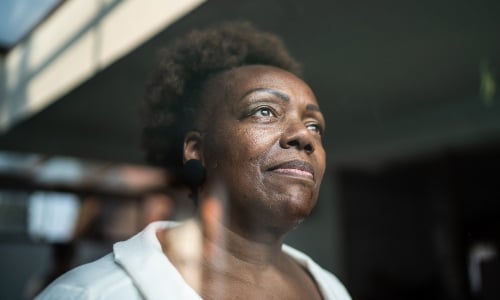More than 2 million pensioners (18%) live in poverty in the UK. These headline figures are worrying enough, but for older people from Black ethnic groups the risk of poverty is nearly twice as high as for White pensioners. Why are people from Black and other minority ethnic groups at greater risk of lower income and poverty in later life?
The latest figures show that 3 in 10 (30%) older people from Black ethnic groups are in poverty compared to 16% of White pensioners. Unfortunately these figures are not published for more specific ethnic groups so we cannot say whether or not poverty rates are the same among Black Caribbean and Black African older people.
Looking further into the financial statistics, we find that older minority ethnic groups have lower average incomes, are more likely to receive means-tested benefits, and less likely to receive private pensions. For example, 44% of Black older households receive an occupational pension compared to 61% of White older households. And on average, Black older households receive £47 a week from occupational pensions compared to £169 for White older households.
Older Black people are also more likely to be tenants in retirement – the Pensions Policy Institute found that only around half of Black people aged 65+ were homeowners in 2018, compared to around four out of five White people aged 65+. This means that, on average, they have lower levels of wealth than White older people and must pay rent throughout retirement.
A greater risk of lower income and poverty in later life
People’s financial position in later life is generally linked to their circumstances over the course of their lifetime. Private pension provision, in particular, is closely related to employment history – this includes the time someone has spent in paid work, their earnings levels, and also the quality of their employer’s pension scheme. The Pensions Policy Institute’s work on ‘underpensioned’ groups has explored some of these differences – for example, finding that average full-time earnings among Black people aged 16-64 are around £1,400 a year lower than that of White people. And Government figures show that 69% of Black 16 to 64 year olds are in employment compared to 76% of all 16 to 64 year olds - although, it is encouraging to see that the gap has reduced somewhat over recent years.
Other factors can also have an impact. For example, if people have moved to the UK during their working life, they will have fewer years in which to build up a private pension and the contributions needed for their full State Pension.
What can be done?
These financial inequalities aren't new – in fact the annual figures on pensioner poverty have long shown the disadvantages that older people from Black and other ethnic minority groups face. However, this year Age UK has been working to highlight the differences that women and people from ethnic minorities face as part of our work on pensioner poverty. See, for example, this recent press release.
These figures were picked up in some of the media coverage including in a headline in the Independent. Age UK has also published a briefing note on ethnicity and financial disadvantage in later life. Greater awareness is only the first step. Because poverty in retirement is linked to years of disadvantage there are no quick fixes. Going forward, to reduce income gaps in retirement, there needs to be improved employment opportunities for people from minority ethnic groups, work to reduce the ethnicity pay gap and better access to private pensions, for example, by strengthening automatic enrolment to increase pension savings.
However, for those already retired, the most effective way of reducing poverty is to ensure that everyone claims the benefits that they are entitled to. Worryingly, we know that many people miss out on their rights – the latest estimates show around £2.2 billion of Pension Credit and Housing Benefit alone are unclaimed by pensioners every year in Great Britain. Unfortunately, these figures are not broken down by ethnicity, but it is likely that older people from minority groups are at least as likely, or more likely, to be missing out on vital support than the older population as a whole. It is important that take-up is increased, and minority groups may benefit from messages and support targeted specifically at them or through trusted contacts and groups.
Tackling poverty, and the causes of poverty among the older Black population needs to be a priority so that everyone can look forward to a comfortable retirement.
Coronavirus, older Black people and health inequalities in the UK
The updated picture of how COVID-19 is impacting Black older people and what this tells us about continuing health inequalities.
Breaking down the barriers of ethnic inequalities in health
One of the reasons that ethnic inequalities in health arise is because of the barriers older ethnic minority people experience in accessing health and care services. What are these barriers and why do people of colour face them?






